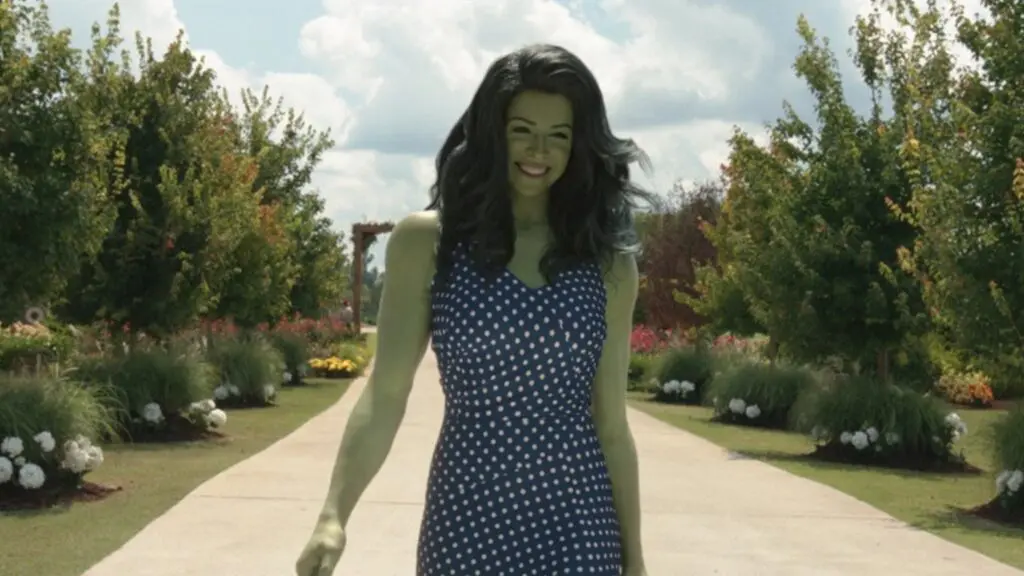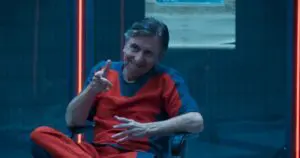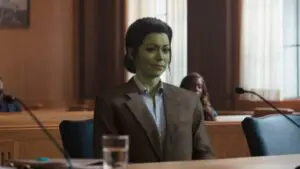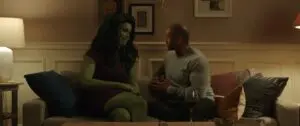Summary
A standalone episode that feels deliberately antagonistic to the audience, “Just Jen” reuses a drab antagonist and doesn’t suggest much intrigue in the show’s immediate future.
As much as I hate being part of the consensus, it’s difficult to make a case for episode 6, “Just Jen,” on multiple levels. Over the last few weeks, I’ve mostly enjoyed She-Hulk: Attorney at Law for what it is, which is a serviceable procedural palate-cleanser between much grander, more self-serious superhero shenanigans.
I haven’t particularly minded its playful tone or its mostly contained storytelling, at least in part because it still felt as if it was a component of a wider mythology and was building to something that we, the audience, weren’t necessarily aware of.
I could have done without a lot of the social commentary, but only because it wasn’t well-written or implemented for the most part; the actual ideas underpinning awful characters like Dennis seemed worthwhile and relevant to me, and still do.
You can boil it down to a question many have asked, most in bad faith – what’s the point of this show? Of course, art doesn’t need “a point”; it exists on its own terms and for its own enjoyment, and the recent trend – ushered in by Star Wars and, of course, the MCU itself – of everything being judged according to what it contributes to canon is pretty concerning.
But it’s worth raising, not because I don’t think She-Hulk has a point, but because I think the point of it is to antagonize a good chunk of its audience deliberately.
Ordinarily, I’d be fine with this – most audiences would do well to be deliberately antagonized more often. But She-Hulk seems to want to have its cake and eat it. Until the final shot of last week’s episode, the fans were responsible for whipping themselves into a frenzy over the forthcoming Daredevil cameo.
But since She-Hulk explicitly teased the imminent arrival of the character and then chose to slot in a self-contained wedding episode right after that, there’s little argument that it’s playing with expectations both intentionally and, at this point, to its own detriment.
Frankly, it isn’t good storytelling. I have no problem with She-Hulk being procedural, but it needs to develop an overarching story in the margins. It needs to be building to something meaningful.
Teasing Daredevil and then not only not capitalizing on the tease but doing an episode that couldn’t be any further from what was implied damages the show’s dramatic cadence. It’s all build-up and no payoff, turning what was fun visual storytelling into what is essentially cynical marketing for later episodes.
It also feels, at least a little bit, like it’s taking the piss.
Not to be paranoid about things. But She-Hulk has been consistently clear about its awareness of audience expectations – the whole, “Oh, Wong, you like him!” fourth-wall break wasn’t exactly subtle, and none of the others have been either.
A certain degree of petulance is implicit in saying one thing and doing another. It isn’t subversion but more like trolling, and while trolling can be funny, that’s only the case if it’s purposeful. I can’t work out what She-Hulk has to gain by goading its audience because it doesn’t seem to be offering anything substantial on its own terms.
Case in point: episode 6. Here, Jen attends the wedding of a high school friend named Lulu (Patti Harrison) and ends up getting into a tussle with Titania, who is obviously there to goad Jen. After a cameo in the premiere and a copyright infringement last week that was ultimately settled in court, why are we still pretending that Titania is a real villain? Or even, for that matter, a real character?
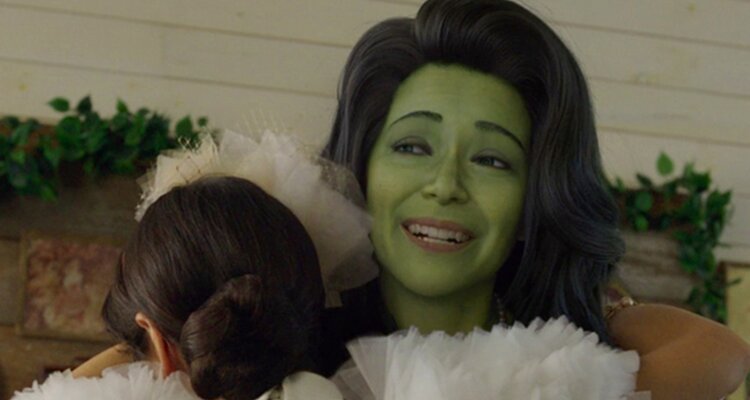
She-Hulk: Attorney at Law season 1, episode 6 (Credit – Disney+)
Once again, I had more fun with the B-plot, but only barely this time. The joke – a man named Mr. Immortal (David Pasquesi) is so conflict-averse that rather than divorce each of his multiple wives, he simply faked his death and rebuilt his identity each time – was quite funny, but Nikki teaming up with Mallory felt like the exact same dynamic as when Jen was teamed up with Mallory just last week.
Yes, we get it, Mallory has a frosty exterior but is quite family-oriented and empathetic; we get it because we’ve learned it the long way two weeks in a row.
I’m always partial to how superpowers manifest in a more mundane way, and I think to She-Hulk‘s credit, between the shapeshifting elf and this guy, it’s doing a good job of highlighting how special abilities would manifest among the normal, flawed people who comprise the cavernous middle ground between “hero” and “supervillain” — which is where, for what it’s worth, Jen herself currently fits. But the show’s doing a terrible – and seemingly worsening – job of making us care where all this is going.

